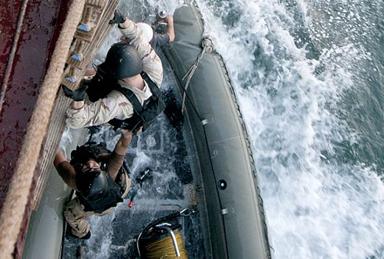
September 2012
On September 17th, 2012, the guided-missile destroyer USS Winston Churchill and other U.S. Navy assets conducted a joint counter-piracy exercise with the frigate Yi Yang of the Chinese People’s Liberation Army Navy in the waters off the east coast of Africa.
This marks the first bi-lateral counter-piracy training exercise conducted between the two countries in history. The mission consisted of visit, board, search and seizure operations. The cooperating elements practiced identifying, boarding and searching suspicious vessels, as well as responding to ships that had been hijacked by pirates. The focus was to hone the cooperation of the two forces in conducting these operations.
Commander Chris Stone of the Winston Churchill explained the significance of the exercise: “Piracy is a threat to the freedom of the seas, economic security, and the safety of mariners from all nations. Bilateral exercises such as this demonstrate the cooperative will of the international community and increases proficiency of multinational forces in confronting the threat. “We have common regional and global security challenges, and we are able to jointly address those by training together.”
The Winston Churchill acted as the mock-pirated vessel, and teams from both countries specializing in visit, board, search and seizure (VBSS) stormed the ship. Operating side-by-side, the combined force successfully completed the mission, assisting the marines who were playing distressed sailors.
Lieutenant Edward R. Kellum shared his thoughts about the training: “It was exciting to interact with the Chinese Sailors and cooperate in a critical environment. “Anytime we work with a foreign military, it adds a different perspective to how we operate. However, to collaborate with the Chinese in an anti-piracy framework is a rare opportunity and a real achievement for maritime security.”
After the exercise, officers from both teams went over what went down and discussed how to better cooperate in the future. U.S. leaders shared expressed the value of coordinating exercises with foreign military outfits, especially in the context of the international operation to police the waters of the Indian Ocean.
“We’re appreciative of the opportunity to train with other nations to establish ties that will allow us to work together to face the piracy threat,” said Stone. “As fellow mariners we have great admiration for our Chinese counterparts who are sailing alongside us and other coalition partners to keep the sea lanes safe.”
Surely, such an exercise was exciting for all participants: the United States and China are not the closest of allies, and recent Chinese aggression in Southeast Asia has many important allies of the United States alarmed. However, it’s excellent to show that nations can come together to participate in ensuring that such a vital body of water for the global community remains secure.